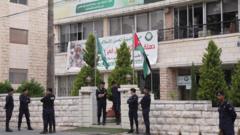Hundreds are arrested in Istanbul as authorities intensify efforts to prevent May Day protests, highlighting ongoing tensions in Turkish politics.
**Istanbul Sees Massive Arrests Amid May Day Protests Crackdown**

**Istanbul Sees Massive Arrests Amid May Day Protests Crackdown**
Authorities deploy heavy police presence as May Day demonstrations face severe restrictions.
In Istanbul, a significant crackdown on May Day protests has resulted in the arrest of hundreds, as authorities deployed an overwhelming force of 50,000 police officers throughout the city. Public transportation was halted to impede access to Taksim Square, a traditional site for workers' demonstrations, which has been effectively banned since 2013.
Footage from the city revealed clashes between riot police and protesters, with disturbing scenes of law enforcement forcibly loading detainees onto buses. The surge in protests follows the arrest of Ekrem Imamoglu, the opposition mayor of Istanbul and a visible challenge to President Erdogan's administration, prompting widespread unrest in March.
On May 1st, known globally as International Labour Day, workers and unions typically hold marches, but this year, an extensive lockdown transformed Taksim Square into a ghost town. Police cordoned off all access points, and residents experienced significant disruptions, with local businesses shuttered and tourists left disoriented. Only select labor groups were granted brief access, carrying red banners, while speakers addressed the public's frustrations regarding the heavy-handed restrictions.
Describing the tense atmosphere, a student named Murat critiqued the situation, stating, "We weren't allowed into the squares... It's not a situation we're facing for the first time. It probably won't be the last." Reports indicate that the authorities had arrested at least 382 individuals for participating in what they termed "non-authorised demonstrations."
Rights organization Amnesty International has condemned the crackdown, urging Turkish authorities to lift the ban on protests and protect democratic freedoms. Their spokesperson criticized the rationale behind these restrictions as baseless, calling for the respect of the right to peaceful assembly.
The backdrop of these protests is the ongoing controversy surrounding Imamoglu's arrest, who has emerged as a pivotal figure in opposition to Erdogan's prolonged rule. While the government defends the judicial process as independent, many view Imamoglu's detention as politically motivated, further igniting calls for reform ahead of the 2028 presidential elections, which Erdogan will not contest if the current constitutional rules remain unchanged.
Footage from the city revealed clashes between riot police and protesters, with disturbing scenes of law enforcement forcibly loading detainees onto buses. The surge in protests follows the arrest of Ekrem Imamoglu, the opposition mayor of Istanbul and a visible challenge to President Erdogan's administration, prompting widespread unrest in March.
On May 1st, known globally as International Labour Day, workers and unions typically hold marches, but this year, an extensive lockdown transformed Taksim Square into a ghost town. Police cordoned off all access points, and residents experienced significant disruptions, with local businesses shuttered and tourists left disoriented. Only select labor groups were granted brief access, carrying red banners, while speakers addressed the public's frustrations regarding the heavy-handed restrictions.
Describing the tense atmosphere, a student named Murat critiqued the situation, stating, "We weren't allowed into the squares... It's not a situation we're facing for the first time. It probably won't be the last." Reports indicate that the authorities had arrested at least 382 individuals for participating in what they termed "non-authorised demonstrations."
Rights organization Amnesty International has condemned the crackdown, urging Turkish authorities to lift the ban on protests and protect democratic freedoms. Their spokesperson criticized the rationale behind these restrictions as baseless, calling for the respect of the right to peaceful assembly.
The backdrop of these protests is the ongoing controversy surrounding Imamoglu's arrest, who has emerged as a pivotal figure in opposition to Erdogan's prolonged rule. While the government defends the judicial process as independent, many view Imamoglu's detention as politically motivated, further igniting calls for reform ahead of the 2028 presidential elections, which Erdogan will not contest if the current constitutional rules remain unchanged.


















